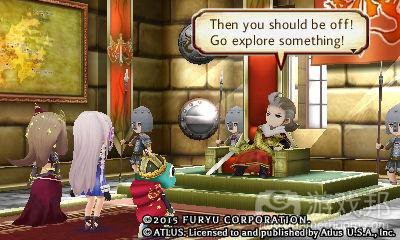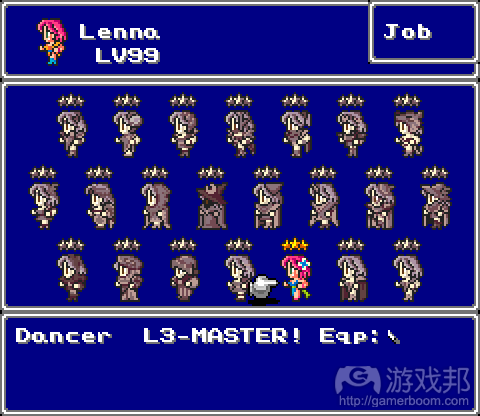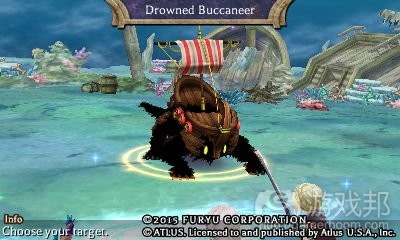解开人们对于《遗产传说》的误解
作者:Christian Nutt
我一直在纠结是否该写些关于《遗产传说》为何如此优秀的内容;但似乎有人认为我对这款游戏拥有很大的误解。即当我将其列入自己最喜欢的2015年的游戏之一,并且我未解释它属于什么类型的游戏以及它是如何运行时,Brandon Sheffield便指出了这一点。
毫无疑问这是我在2015年最喜欢的一款游戏,但是它却遭遇了忽视,误解与诽谤,特别是当看到与我一样和这款游戏有点联系的人对它的忽视时,我真的觉得很遗憾。
实际上我也认为他们是最有可能误解游戏的人。许多时间不够并且喜欢JRPG游戏的人总是会减少自己玩大型游戏的时间,而我的想法刚好与之相反。你需要更深入地了解怎样的游戏能够真正带给自己乐趣。
而对于真正的目标玩家来说,我认为玩《遗产传说》能带给他们真正的奖励感。
JRPG的诅咒
关于主机RPG游戏领域流传着某些理念已经10多年了;当我在回顾PlayStation 2时代的游戏,即当JRPG广为流传的时候,我便意识到了这种情况。我可以毫不夸张地说,我几乎回顾了大多数JRPG游戏。
关于那个时代始终萦绕在我脑子里的一件事便是,尽管这类型游戏不断扩展,但是我最关心的大多数游戏却几乎遭遇了人们的忽视,如《影之心》,《真女神转生3:狂热版》以及《卡片召唤师》(尽管这并不是一款真正的RPG,但却很适合这类型游戏的用户)。不管我说了什么或写了什么,人们总是会回复道:“不了,谢谢。”
不管怎样我都认为你们一直都对这类型游戏具有很深的误解,即我发现在西方《最终幻想VII》才是真正受欢迎的这类型游戏。
首先,它们都是受故事推动的游戏。
其次,玩家玩游戏并非因为游戏玩法;它们的游戏玩法主要是受到故事的影响—-这就像有着坚硬外壳的牡蛎一样,玩家需要敲掉外壳才能获取里面柔软的肉。
虽然这些理念都很荒谬,但是它们却非常有力。
而与这种情况不同的是,我玩《遗产传说》却是因为游戏玩法—-因为这款游戏并未真正拥有自己的故事!
而这也是人们所抱怨的情况,并认为这是这款一流游戏失败的原因;但是我却认为这是一个加分点。我非常满足于玩一款没有多余对话的游戏。开发者只是花时间去创造那些自己感兴趣并且自己擅长的内容。实际上游戏中不存在故事是他们故意这么做的,并非什么漏洞。
那些认为JRPG=故事的看法是错误的。有许多出色的游戏案例能够反驳这一看法。我便能够列出许多例子,我们甚至可以追溯回20世纪80年代,即那时候主机平台仍是这类型游戏的目标平台。
那游戏玩法呢?我发现这也不是决定因素。这并非我能阻止人们讨厌JRPG或无视JRPG的原因。我是在写下本文的时候发现这点的,并且隔天我发现有些人以同样的说法在谈论一款2015年大受欢迎的游戏,并且他们并未带着任何讽刺意味。
他们似乎并未意识到这并不是那些喜欢玩JRPG的玩家看待它们的方式。其实道理很简单:如果我不喜欢玩游戏,我也就不会喜欢这类型游戏。似乎这对我来说是再明显不过的事了,所以我不知道为什么别人会有不同想法。
所以关于《遗产传说》游戏玩法人们到底有什么抱怨呢?
这款游戏的核心便是关于“探索与征服的”JRPG。游戏玩法是围绕着在大型地图中穿梭并尝试着通过打击敌人让自己变得更强大并最终走遍游戏世界,绘制出这个世界的地图并发现一切可发现的事物。
当然了这里也有等待玩家去对抗的boss,但这些内容都属于附带内容;玩家的主要任务还是在游戏世界中游荡并为角色升级,赢得需要来自回合战斗系统的真正技能才能生存下来的艰难战斗。
游戏的基本背景是,一个遗失大陆出现在了海面上,并重新复苏了那片充满魔法生物和神器的荒地。玩家在此的冒险便是去探索各种战利品并明确游戏到底会如何发展。对的,玩家便是在这时候进入游戏中:当你出现时你会观察这片荒野,并且这里的崩塌仍在持续着,你需要获取武器,魔法和技能去完成任务。你将激活一些基本设备并开启更多领域,从中前往更多地方。
这其实是一种非常传统的设置,但就我所认为的真正传统的JRPG游戏应该会遵循一个非常基础的框架(游戏邦注:即通常会包含像城镇,地下城,基于回合的战斗系统等元素),然后会从根本上去调整游戏内容去呈现出全新游戏体验。
而《遗产传说》的第一个重大调整便是玩家不能只是获取经验点数并不断升级。这里也不存在技能树。在战斗期间,玩家将基于自己所使用的技能而不断学习新技能(如果你面对的敌人越强大,你学习新节能的机会便会越大)。人们往往会认为这是随机的设定,但其实并不是。这是与我们通常看到的JRPG截然不同的设定。
但我意识到人们并不喜欢这样的设定。从“经典”角度看来这似乎是没有意义的—-就像早前的《最终幻想》都会奖励给玩家经验点数并定期为玩家开启一些新能力。当然了,也并非每一款游戏都是基于同样的规则,即使是《最终幻想》也并非都是如此。
我认为《遗产传说》只是不适合我们现在所居住的时代,即我们现在所玩的游戏都带有能够让玩家事先规划前进路线的技能树。
然而对于我来说,这样的设定却非常适合游戏夸张的冒险与谜团等主题;更重要的是你还能从自己所学到的东西中获得大量乐趣。甚至当出现一些适得其反的效果时(如“我现在需要治愈能力,但是我学到的却是如何恢复地位和作用。”)也能为游戏添加一些反转的不可预测性。我真的觉得这点很有趣。当你在战斗过程中仍然能够学到全新技能时,你便会觉得这种奖励是有形且直接的。
这里还存在另一个要点:因为你不能通过累计点数去缓慢而稳步地前进,所以你便没有理由去参与无止尽的战斗。对于玩家来说,比起不断攻击那些脆弱的敌人,追逐强大的敌人并制定战略去获取最终胜利更有趣。而这也与游戏的探索核心紧密维系在一起,当然了,这并不是巧合。
实际上这款游戏的设计非常困难。游戏中的敌人非常强大,他们会无情地发挥自己的能力,并且根本不会对你手下留情。同时敌人的能力也是不容小觑的。这便意味着你要想打败他们就必须有效使用你所拥有的能力。你必须谨慎做出选择,考虑怎样的行动最合适,并在遇到一大波敌人时优先选择解决对象。
这是基于类似《最终幻想XIII》的典范转移的系统。这里存在多种前进方法以及适合不同前进方法的不同能力。在每个回合中,你能够选择一种团体形式,然后再选择你想要使用的能力。但与《XIII》不同的是,这更像是一种传统的回合制系统;即就像我说过的,你能够在不同回合中制定不同策略,并选择那些能够帮助自己赢得战斗的能力。
通常情况下你必须不断转换策略,否则你便很容易输掉战斗。有时候冒险的决定也能够带给你回报;而有时候这却会将你带向万劫不复的深渊(之后你需要再次尝试着爬出这一深渊)。因为这是回合制系统,所以你拥有思考的时间,你需要把握住所有时间。这便是游戏的乐趣。虽然很难,但却也是公平的。
实际上,《遗产传说》拥有一个有效区别于友好的现代游戏的微妙但却很重要的元素,即只要仍有个角色活着,玩家便可以随时以100%的成功率逃离战斗。而这里存在的问题是,一旦玩家逃离了战斗,就必须再次回到地下城的入口处。
因为游戏的目标是探索地下城,所以这便是玩家需要认真衡量的选择。虽然这么做违背了游戏目标,但如果不这么做玩家可能就要面对死亡。这样的设置能够让玩家避免在游戏中受挫,而玩家通常也会在不得不这么做的时候才会做出这样的选择。而一旦你不得不这么做时,这便会成为一种宽慰。
通常情况下人们总是会将“简单”与“简单化”混淆在一起,我认为《遗产传说》便是这种错误思维的牺牲品。它混淆了玩家对于RPG的期待。但是我们必须清楚,有关游戏是无限提供不同内容让玩家去做,去收集,去厮杀的理念是当下所盛行的,而在JRPG刚出现的时期并非如此。如果你想要玩一款完全与时代同步且不断延伸的JRPG,你大可以选择《异度之刃X》。而如果你想要玩的是更加集中且节奏较快的游戏,那么《遗产传说》便是最佳选择。
实际上这款游戏的创造拥有一个非常特别的目标:传达专注于探索,发现,战斗,挑战和经验等特殊游戏玩法的RPG游戏体验,除此之外的其它游戏内容一点都不重要。这是一种经过深思熟虑的设置;所以这并不是一种错误。这同样也体现在了其它决策中:游戏中有大量可选择的boss以及极少的金钱和真正出色的装备。
实际上游戏中拥有大量的武器,并且每周武器都拥有自己特殊的技能,但是游戏并不会告诉你怎样的角色适合怎样的武器或你在使用它们时能够学到怎样的能力,我认为只要当你不再认为这是游戏漏洞并开始将其当成一种功能时,你便能够领悟到这些。
这款游戏经常被拿出来与世嘉的游戏作比较,而当我听到其中的缘由时我也觉得非常有道理,但是因为我玩的世嘉的游戏不多,所以我不能真正对此作出点评。
有趣的是,《遗产传说》这款游戏会让我想起《光明与黑暗》,即1991年出现在世嘉五代上的游戏。其实我并不是真的这么想的。《遗产传说》并不像这款游戏,但是当我在玩游戏的时候会觉得他们具有同样的氛围。《光明与黑暗》是一款带有回合战斗的大型第一人称地下城游戏,非常具有挑战性。我从未真正战胜过游戏(因为我并未意识到开发者希望玩家逃离坐标纸并创造属于自己的地图),但是游戏却给我留下了非常深刻的印象。
但是不要以为我对怀旧元素充满幻想。《遗产传说》并不是一场怀旧之旅。我之所以提到这个例子只是想传达这类型游戏具有多样性,并希望带给玩家各种不同的满足感。如果说有什么是我一定要传达给你们的,那应该是《遗产传说》与《光明与黑暗》一样都是非常有趣的游戏这一事实。
真正吸引我的是:设计师专注于创造能够提供给玩家特殊体验的游戏玩法,而我也真的很喜欢这种体验。我可以坐在那听着Masashi Hamauzu的原声带,轻松地尝试并搞清楚如何做自己想要做的事。这种时候我就能够自然地忘记坐标纸了。
(本文为游戏邦/gamerboom.com编译,拒绝任何不保留版权的转发,如需转载请联系:游戏邦)
The secret of The Legend of Legacy
by Christian Nutt
I’ve been pondering writing something about why The Legend of Legacy is good for awhile now; the game seems, to me, to be largely misunderstood. But it wasn’t until Brandon Sheffield pointed out that when I listed it as one of my favorite games of 2015, I didn’t really explain what kind of game it is or how it works that I really felt ready to tackle the topic.
Because it absolutely is one of my favorite games of 2015, and it is overlooked, misunderstood, maligned — and in particular, I think it’s a shame that it’s likely to be discounted out of hand by people who might well connect with it like I did.
In fact, I think they’re some of the most likely to dismiss it. Many people who have limited time and love the JRPG genre tend to save what time they do have for the big games, but my philosophy is increasingly becoming: Fuck that. You need to dig deep and figure out which titles you’re genuinely going to enjoy.
For the right person, I think playing a game like The Legend of Legacy will be more genuinely rewarding than anything else.
The Curse of the JRPG
There are some ideas that have been floating around the console RPG space for more than a decade now; I really identified this phenomenon when I was reviewing games during the PlayStation 2 era, when the JRPGs flowed freely. It’s not an exaggeration to say that I reviewed most of them.
One of the things that stuck with me about that era is that despite the proliferation of the genre, many of the games that I cared most about seemed to be all but ignored: Shadow Hearts: Covenant, Shin Megami Tensei: Nocturne, and (though it’s not really an RPG, it fits the audience profile) Culdcept were very much overlooked. I had people telling me “no thanks” no matter what I said or wrote.
Anyway, I think you can trace the persistent misconceptions about the genre that I have identified back to the fact that Final Fantasy VII was the game that really popularized the genre in the West.
One is that they’re story-driven games.
The other is that they’re not played for their gameplay; their gameplay is something that’s suffered for the story — something you crack through, like the shell of an oyster, to get the soft meat.
These ideas are entirely fallacious, I’d argue, but they’re also tenacious.
The Legend of Legacy is clearly a game I play exclusively for the gameplay — because it hasn’t really got a story at all!
People complain about that, as you must have guessed by now, as a big-time failing of the game; I consider it a bonus. I’m perfectly content to play a game that zooms along without superfluous dialogue. Let the developers spend time on what interests them and what they’re good at. The fact that there is no story is obviously on purpose, not a mistake.
The supposition that JRPG = story is, well, flawed. Plenty of notable examples of the genre suggest otherwise. I could make a list, and it would stretch back to the 1980s and touch on every notable console platform that has been home to the genre, I’d wager.
And the gameplay thing? Well, I find that to be completely and utterly invalid. It’s not that I don’t get that some people don’t like JRPGs, or just don’t care about them. I found this while writing this post, and it made me laugh, but the next day I saw someone say much the same thing about a popular 2015 game, and they said it without a touch of irony.
What they don’t seem to realize is that this is not how the genre is perceived by people who do like playing it. Look, it’s simple: I wouldn’t like the genre if I didn’t like playing the games. This seems so incredibly obvious to me that I cannot think why anyone imagines otherwise. It’s a seemingly incurable hangover of that brief time when people who didn’t like playing them felt compelled to.
Go explore something!
So: What’s so durn special about The Legend of Legacy’s gameplay, then?
Well, the core of the game is sort of an “explore and conquer” JRPG. The gameplay is centered on wandering around large maps, trying to get more powerful by fighting enemies, and ultimately exploring everything in the world, mapping it, and discovering everything there is to find.
Sure, there are bosses to fight and switches to flip, but that stuff is almost incidental; it’s very much about spending time poking around in the world and powering up your characters, and fighting battles that can be genuinely tricky to survive — and require actual skill with a turn-based battle system.
The basic premise (even a game without a strong story needs a premise) is that a lost island continent has risen from the sea, bringing wilds and ruins full of magical beasts and artifacts to the light. Adventurers descend to explore its spoils and figure out just what the hell is going on. And that’s where you come in: You head out, take stock of the wilderness and the crumbling keeps strewn about it, and obtain weapons, magic, and skills to aid you in your quest. You activate elemental devices, and open up more areas, and go on from there.
It’s traditional, but in the sense that the tradition — the true tradition of the genre, as I see it — is to create games that follow a very basic framework (typically including things like towns, dungeons, and turn-based battle systems) and then tweaking them substantially to bring new gameplay experiences.
The first major tweak to The Legend of Legacy is that you don’t simply earn experience points and level up. Nor is there a skill tree. During battles, you’ll simply learn new skills on the fly based mainly on the ones you use (it seems the chance to learn new skills increases relative to how tough the enemy you’re fighting is.) People tend to think it’s random, but it’s not — it’s opaque. That’s different, and it’s an important difference.
People really dislike this, I’ve realized. It doesn’t seem to make sense from a “classic” perspective — like old Final Fantasy games that awarded experience points and periodically unlocked new abilities on level up. Never mind, of course, that not every game played by those same rules, even then — not even Final Fantasy. Never mind that there’s nothing objectively better or more transparent about it.
It certainly doesn’t fit in with the era we live in now, with skill trees that let you plan out your path of advancement hours and hours in advance.
For me, though, it fits the game’s theme of swashbuckling adventure and mystery; more important is the fact that it’s a ton of fun to be surprised by what you learn. Even when it backfires (as in, “I really needed to heal right now, but I learned how to heal a status effect instead”) it adds a pinch of spicy unpredictability to the game. It really hooked me and put a smile on my face — a genuine “this is fun, and I want more of it” smile, while I was playing. Since you learn the new skills while the battle is still in progress, there’s a very tangible, immediate sense of reward.
There’s another point to be made, here: Because you don’t slowly and steadily advance simply by accruing points, there’s no reason to fight endless battles. It’s much better to seek out tough enemies and try to persevere, and strategize to win, than it is to stop and grind on enemies which are easy (and not coincidentally, boring) to defeat. That this ties into the game’s focus on exploration, is, of course, no accident.
The fact is, the game is tough by design. The enemies are strong, and use abilities mercilessly; they will not go easy on you or act “stupid” just to give you an easy time. Their abilities are not crippled. And all that means that to fight effectively, you have to strategize with the abilities you have got. You have to choose carefully, and consider what the best course of action is, turn-by-turn, character-by-character, and (crucially) enemy-by-enemy, prioritizing which ones to take out first when confronted with an encounter with a bunch of foes.
This is amped up by a system that’s, come to think of it, kinda like Final Fantasy XIII’s Paradigm Shift. There are several stances, and different special abilities are best suited to different stances. On each turn, you select a party formation and then pick the abilities you want to use. But unlike XIII, it’s a traditional turn-based system; like I said, you strategize turn-by-turn, to deliberately select the abilities you think will help you make it through the battle.
Oftentimes, you have to keep shifting strategies, or you’re going to lose. Sometimes, a risky play pays off; sometimes, it digs you into a hole (that you now have to try and climb back out of.) And because it’s turn-based, you have time to think; time to pick and choose. That is what’s fun about the game. It’s tough but fair!
In fact, the game has one subtle but significant touch that takes it from the realm of relic to friendly modern game — which is that you can run from battle with a 100 percent success rate, at any time, as long as one character is still alive. The catch is that running from battle dumps you back at the entrance of the dungeon.
Since the goal of the game is to explore the dungeons (and fill in their maps by doing so) this is a choice you really have to weigh. It’s against the goal of the game, but so is dying. It’s always there, and it keeps the game from being frustrating, but you don’t want to do it unless you have to. But when you do have to do it, it’s such a relief. (Oh, and you can save anywhere, too.)
Very often, people confuse “simple” with “simplistic”, and I think The Legend of Legacy has fallen victim to this sort of misguided thinking. It confounds players’ expectations of what an RPG is. But, look, this idea that games are endless buffets of zillions of kinds of different things to do and collect and kill is actually pretty recent, or at least, it certainly didn’t hold sway during this genre’s formative years. If you want a sprawling JRPG that is completely in-step with the times in that sense and more, you can always play Xenoblade Chronicles X. If you want a more focused and quicker-paced game, The Legend of Legacy is there for you.
The fact of the matter is that the people who made this game had a very specific aim: To deliver a honed RPG experience that focuses on a very specific sort of play, in which exploration, discovery, battle, challenge, and surprise are the most important, and other things that the game could have done are, as it turns out, not important at all. And that’s deliberate; it’s not some sort of error. It’s reflected in other decisions, too: The large numbers of optional bosses, and the scarcity of both money and really good equipment.
The fact that there is a large number of weapons and each has its own set of associated skills, but the game doesn’t tell you which work well with which character nor what abilities you’ll learn as you use them, well… I think it illustrates something about the game, as soon as you stop looking at it as a bug and start perceiving it as a feature. You’re supposed to be figuring this stuff out, and, let me clue you in: You can.
The game has most often been compared to the SaGa franchise, for a lot of reasons that seem to make a lot of sense when I hear them; I can’t really speak to that, though, because I feel like I never quite got any of the SaGa games that I did play, which is something I’m going to have to remedy some day.
The game Legend of Legacy does put me in mind of, surprisingly, is Shining in the Darkness, which came out on the Sega Genesis in 1991. I hadn’t really thought about it in years. No, Legend of Legacy doesn’t look anything like it, but it gives me the same vibe when I play it. Shining in the Darkness was a huge first-person dungeon crawl with turn-based battles, and very challenging; I’d make it a little bit further, each go, and then limp back to town to lick my wounds and, if I got lucky, upgrade my gear. I never beat it (because I somehow never realized that developers, back in the day, were expecting you to bust out graph paper and make your own maps — I wish somebody had told me) but I have such fond memories of it. I certainly didn’t expect to be back in that headspace now.
Don’t mistake my reverie for nostalgia. The Legend of Legacy is not a nostalgia trip. I brought up that example simply to illustrate that the genre has always had variety to it, and brought different kinds of satisfaction to its players. If there’s one thing I want to communicate to you, it’s that The Legend of Legacy is seriously fun to play, as Shining in the Darkness was.
That’s what gets me about it: the designers focused the gameplay to providing one specific kind of experience, and I really enjoy that experience. I can sit there with the Masashi Hamauzu soundtrack pushing me along, and just happily try and figure out how to do what I want to do. And this time, it’s okay to forget the graph paper. (source:Gamasutra)
上一篇:为你的独立游戏添加市场营销策略










































 闽公网安备35020302001549号
闽公网安备35020302001549号